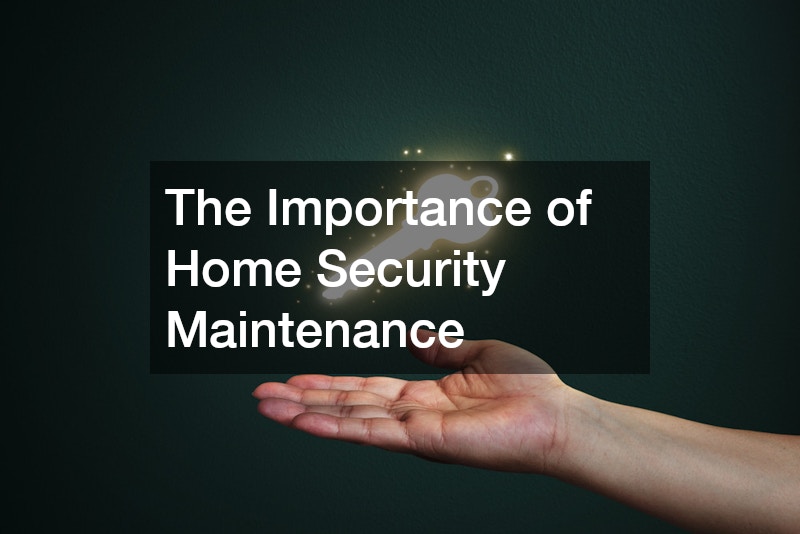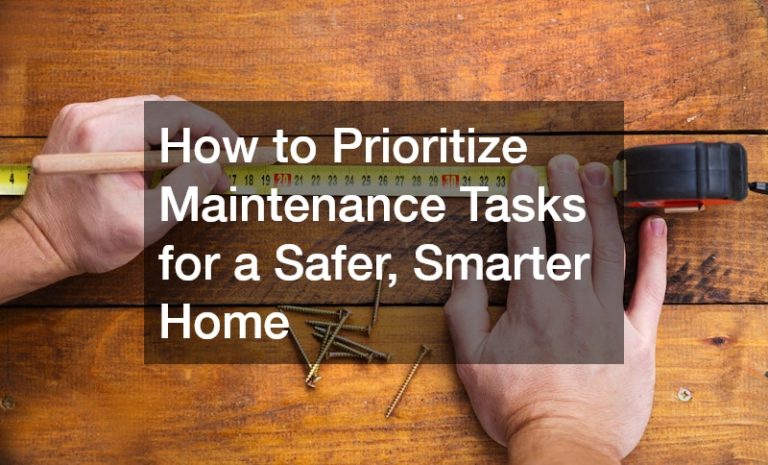

Becoming a homeowner is an exciting milestone, but it comes with the responsibility of regular maintenance to ensure your property remains in excellent condition. This article aims to provide essential tips and guidelines for new homeowners to maintain their homes effectively. By staying proactive, you can enjoy your home while avoiding costly repairs in the future.
1. How Often Should I Inspect My Home?
A. Seasonal Inspection Guide
Regular inspections are crucial for maintaining the integrity of your home. A good rule of thumb is to conduct seasonal inspections to address potential issues before they escalate. For example, check your roof and gutters in the spring and fall to clear debris and assess any damage from winter weather. In the summer, focus on your yard and landscaping, ensuring local landscapers are aware of your needs for optimal plant health. Lastly, inspect your home’s systems—like plumbing and HVAC—at least twice a year to catch any problems early.
B. Tools Needed for Home Inspection
Investing in a few basic tools can make your inspections easier. A flashlight is essential for checking darker areas like attics or basements, while a ladder will help you safely inspect your roof and gutters. A moisture meter can assist in detecting water damage, which is critical for preventing mold. For more extensive inspections, you might consider a basic toolkit that includes screwdrivers, pliers, and even a comprehensive home inspection checklist to ensure you don’t miss any important areas.
C. Hiring a Professional vs. DIY Inspection
While DIY inspections can be effective, hiring a professional can provide peace of mind. Professional inspectors have the experience and tools to catch issues that a homeowner might overlook. For example, if you suspect water damage, a water remediation expert can assess the extent of the issue and suggest the best solutions. However, for general maintenance tasks, you can save money by taking on some inspections yourself, especially if you’re comfortable with the necessary tools.
2. What Are the Most Important Areas to Maintain?
A. Roof and Gutters
Your roof is your home’s first line of defense against the elements. Regularly inspect shingles for damage, and clean gutters to prevent water from pooling, which could lead to serious issues. If you notice significant wear, it might be time to hire siding contractors or roofers to assess and repair your roof.
B. Plumbing System
The plumbing system requires regular attention to prevent leaks and water damage. Check under sinks and around toilets for any signs of moisture. Be proactive about scheduling routine inspections with a licensed plumber to ensure that your system is functioning properly. If you have an older home, consider looking into septic installation and maintenance, as these systems can require specialized care.
C. HVAC Systems
Your heating, ventilation, and air conditioning (HVAC) systems are essential for comfort and energy efficiency. Change filters regularly—at least every three months—and schedule annual inspections with an HVAC technician. They can help you assess the efficiency of your system and identify if you need any upgrades, such as new insulation or energy-efficient appliances.

3. How Can I Extend the Life of My Appliances?
A. Regular Cleaning and Maintenance
Appliances are a significant investment, and regular cleaning can extend their lifespan. For instance, clean the coils on your refrigerator every few months and check your washing machine for debris that could lead to clogs. Simple upkeep, such as running vinegar through your dishwasher or regularly cleaning upholstery supply items, can also prevent wear and tear.
B. Energy Efficiency Tips
Consider upgrading to energy-efficient appliances that can save you money on utility bills. Look for ENERGY STAR-rated products, which meet strict efficiency guidelines. In addition, practice energy-saving habits, like turning off appliances when not in use and utilizing power strips to manage multiple devices.
C. When to Replace Old Appliances
Appliances have finite lifespans. While regular maintenance can extend their life, it’s important to recognize when replacement is necessary. Keep an eye out for signs of wear, such as unusual noises or inconsistent performance. If repairs become frequent and costly, it may be more economical to invest in a new appliance.
4. What Should I Include in My Home Maintenance Checklist?
A. Monthly Tasks
Create a checklist of monthly tasks to stay organized. These might include checking your smoke detectors, cleaning out your refrigerator’s drip pan, and inspecting air filters. It’s also wise to examine your garage door for any signs of wear that could necessitate garage door repair.
B. Quarterly Tasks
Every three months, inspect your home for pests, check the caulking around windows and doors, and clean your appliances. This is also a good time to check in with local landscapers to ensure your garden is thriving and that any necessary treatments are being administered.
C. Annual Tasks
On an annual basis, schedule a comprehensive home inspection. This should include an assessment of your roof, HVAC systems, plumbing, and electrical systems. It’s also a good idea to review your insulation with an insulation company, particularly if you notice drafts or fluctuating energy bills.
5. How Can I Prevent Common Household Issues?
A. Water Damage and Mold Prevention
Water damage can lead to significant issues, including mold growth. To prevent this, ensure that your gutters and downspouts direct water away from your foundation. Inspect your home for leaks and have any concerns addressed by a professional. Water remediation services can help manage existing problems and prevent future occurrences.
B. Pest Control Strategies
Pests can quickly become a nuisance if not managed properly. Implement preventive measures, such as sealing cracks in your home’s exterior and keeping food stored in airtight containers. Regular inspections with pest control experts can also help catch issues before they escalate.
C. Avoiding Electrical Hazards
Electrical hazards are serious and can be easily overlooked. Check for frayed wires, ensure outlets are in good condition, and avoid overloading circuits. If you have any concerns, consult a licensed electrician to assess your home and provide necessary repairs.

6. What Are the Best Practices for Yard and Landscape Maintenance?
A. Lawn Care Basics
A well-maintained lawn not only enhances your home’s curb appeal but also protects against soil erosion. Regular mowing, watering, and fertilizing are essential. Engage local landscapers to help design and maintain a landscape that suits your climate and soil type. Where art advisors can help with interior decor, landscapers can help outside
B. Tree and Shrub Maintenance
Trees and shrubs require special attention to thrive. Regular pruning helps maintain their shape and health. Be mindful of any signs of disease, and consult a professional if you’re uncertain about the care needed.
C. Sustainable Gardening Tips
Consider implementing sustainable gardening practices. Use native plants that require less water and maintenance, and practice composting to enrich your soil. This not only benefits the environment but can also save you money on landscaping.
7. How Do I Maintain My Home’s Exterior?
A. Painting and Siding
Regularly inspect and maintain your home’s exterior to prevent deterioration. This includes repainting every five to ten years and repairing or replacing siding as needed. Engaging siding contractors can ensure that the job is done correctly and that your home remains protected from the elements.
B. Deck and Patio Upkeep
If you have a deck or patio, regular maintenance is key. Clean surfaces to prevent mold and ensure that wood is treated to resist decay. Periodic inspections can help catch any necessary repairs before they become larger issues.
C. Window and Door Sealing
Inspect seals around windows and doors to improve energy efficiency. This can significantly reduce heating and cooling costs. If you notice gaps, consider window replacements to improve both appearance and efficiency.
8. How Can I Improve Energy Efficiency in My Home?
A. Insulation and Weatherproofing
Good insulation is crucial for maintaining comfortable indoor temperatures. Hire an insulation company to assess your home and recommend improvements, particularly if you live in an older home. Proper weatherproofing will also help keep your energy costs low.
B. Smart Home Technology
Incorporating smart home technology can greatly enhance energy efficiency. Programmable thermostats and smart lighting systems allow you to control energy usage more effectively, saving you money over time.
C. Renewable Energy Options
Explore renewable energy options, such as solar panels, which can significantly reduce your reliance on conventional energy sources. This investment not only saves money in the long run but also contributes to a more sustainable lifestyle.

9. What Should I Know About DIY Projects vs. Hiring Professionals?
A. Pros and Cons of DIY
DIY projects can be rewarding and cost-effective, but they require time and skill. Assess your abilities honestly. For tasks like painting or minor repairs, going the DIY route may be feasible. However, complex jobs—like septic installation—should be left to professionals to ensure safety and compliance with local regulations.
B. When to Call in the Experts
Certain situations demand professional expertise. If you encounter significant plumbing issues, electrical hazards, or structural problems, it’s best to consult experts. Additionally, specialized tasks like window replacements often require skilled labor to ensure proper installation.
C. Cost-Benefit Analysis
Evaluate the costs associated with DIY versus hiring professionals. While DIY can save money, consider the value of your time and the potential for costly mistakes. In many cases, hiring a professional may be more cost-effective in the long run.
10. How Do I Budget for Home Maintenance Expenses?
A. Setting Up a Maintenance Fund
Establishing a maintenance fund is crucial for managing homeownership costs. Aim to save 1-3% of your home’s value annually for maintenance and unexpected repairs. This fund can alleviate financial stress when issues arise.
B. Prioritizing Maintenance Tasks
Not all maintenance tasks are equally urgent. Prioritize based on severity and impact. For example, addressing a leaky roof should take precedence over landscaping updates. Create a schedule to ensure critical tasks are completed promptly.
C. Saving on Costs with Preventive Maintenance
Regular preventive maintenance can save you significant money in the long run. By catching issues early and addressing them, you can avoid costly repairs and extend the life of your home’s systems and features.
11. What to Know About Seasonal Maintenance Tasks
A. Winter Preparation
As winter approaches, it’s crucial to prepare your home for colder temperatures. Insulate pipes to prevent freezing, check your heating system, and clean out your gutters to ensure proper drainage and reduce ice buildup. If you have a fireplace, schedule a professional cleaning and inspection to ensure it’s safe to use. Additionally, consider using insulation company services to evaluate and enhance your home’s insulation, which can lead to significant energy savings.
B. Spring Cleanup
Spring is the perfect time to conduct a thorough home inspection and deep cleaning. Begin with your outdoor space by engaging local landscapers to tidy up your garden, remove debris, and prepare your lawn for the growing season. Check for any water damage that may have occurred during winter and address any issues with your roofing or siding. Spring is also an ideal time to evaluate your home’s energy efficiency; consider window replacements if you notice drafts, as they can significantly improve your home’s insulation and reduce heating costs.

12. The Importance of Home Security Maintenance
A. Regular System Checks
Home security systems require regular maintenance to function effectively. Test alarms and sensors monthly, and change batteries as needed. Ensure that cameras are positioned correctly and that their lenses are clean for optimal performance. If you notice any issues, it might be time to call in a professional to assess and repair your security system.
B. Landscaping for Security
Your landscaping can play a significant role in your home’s security. Maintain clear sightlines by trimming trees and shrubs that could hide intruders. Local landscapers can help design a landscape that enhances both beauty and safety, incorporating lighting and strategic plant placement to deter potential threats. Additionally, consider installing motion-sensor lights around your property to improve visibility and security.
Conclusion
Regular maintenance is key to preserving the value of your home and ensuring it remains a safe and comfortable environment. By following these tips and staying proactive about home care, you can avoid costly repairs and enjoy your home for many years to come. Remember, whether you’re engaging siding contractors, parking lot sealcoating companies, local landscapers, or an insulation company, investing in the right services can save you both time and money. Embrace the responsibilities of homeownership, and your home will reward you with comfort, security, and peace of mind.

